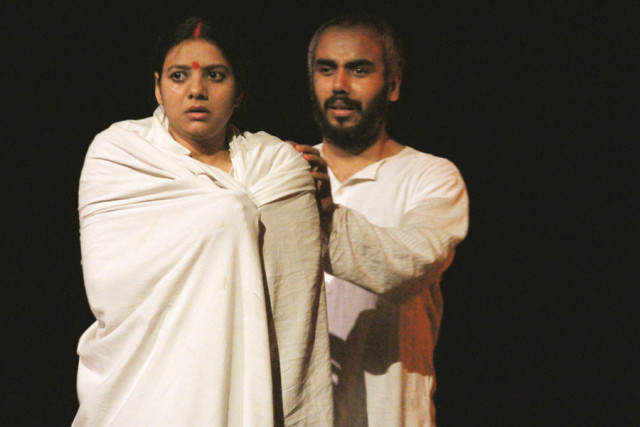Raddi Bazaar: On the importance of life and living
Sanatanu Bose’s play explores the extraordinary within the ordinary to deliver a powerful impact.

Sanatanu Bose’s play explores the extraordinary within the ordinary to deliver a powerful impact.
Either they overestimate the tolerance of a human bladder or there is something divine about the three hours duration that Indian entertainers are obsessed with maintaining. They take ages to build up a story and civilisations rise and fall in the time they resolve the climax, not realising that the epic treatment of the narrative has robbed it of all the meaning and poignancy that surrounded the flashes of brilliance it had to offer.
Raddi Bazaar by Satlake Mohnitharan theatre troupe went through a similar journey at Napa, but it had more than just flashes of brilliance. It was a theatrical masterpiece, overshadowed by the odiously long duration.

The troupe comprised of fresh graduates from the renowned National School of Drama (NSD), New Delhi, who had interwoven two different plays by Badal Sircar. The play Pagla Ghora explores the different forms of relationships that men and women share in society; starting out with a man resurrecting a dead woman to do his catharsis. The second play, Baaki Itehas, on the other hand, revolves around the life of a couple, Sharadh (Sunil Soni) and Vasanti (Mangla Kaduba). Sharadh is a film editor and Vasanti is a script-writer who has run out of ideas and is looking for a plot. Simultaneously, we enter the lives of Sitanath (Ashok Kumar) and Kanak (Lapdiang Artima), a couple that is the complete opposite of Sharadh and Vasanti. Sitanath is a school teacher who does not earn enough to make ends meet, and his wife Kanak dreams about a happy life, who is ready to take any step to escape her reality.

Enters Sharadh’s affluent friend Nikhil (Sonmoni Sarmah), and the story takes a rather shocking range of twists and turns.
The three stories are performed one after the other, and though they are interwoven quite weakly and turn out to be very predictable, that does not take away the impact that the performance succeeds in giving. Iwaam Indrajeet by Circar was also meant to be amalgamated in this play, but wasn’t.
Sanatanu Bose, the director who couldn’t make it to Pakistan due to prior commitments is the reason behind such a powerful result out of an ordinary plot about the ordinary lives of different people. Blocking is the key to Raddi Bazaar’s success, as Bose makes sure that the entire stage is utilised with practical justifications for characters to move around, unlike the local practice of restricting characters to certain spaces, with movement largely directed by the dialogues. That, however, couldn’t be achieved without a rather dynamic use of stage space, where even the grid and the hall exit doors were utilised and used as performance space.
This not only made the audiences move their necks around, but also made sure that the play turned out to be more of a tangible experience — a dimension that local theatre is catching up to, slowly and gradually.
Talking about the added dimension, the theatrical experience reached its pinnacle when the audience could smell the stench of dead fish and linseed oil, as it was being used on stage.

The stage itself was given a rather circular layout as the audiences were seated on and off-stage and the people who switched places after the interval could feel the definite difference in perspective and proximity from characters. This not only enhanced the overall theatrical experience, but also blurred the line between fiction and reality from the audience’s perspective.

In terms of performances, all the characters were very focused in their approach and the long duration did not tax energy. Ashok Kumar and Mangla Kuduba turned out to be the highlight among performers, who were all very controlled and clinical in their approach towards a play that was essentially about the world being a Raddi Bazaar — a place where the sum of all your emotions, problems, neurosis, pride, rituals, wants, needs and necessities are nothing more than wasted pieces of paper that could easily be sold and resold at a cheaper price. The play, quite passionately, makes you realise the importance of life and living.
Published in The Express Tribune, March 25th, 2014.
Like Life & Style on Facebook, follow @ETLifeandStyle on Twitter for the latest in fashion, gossip and entertainment.



















COMMENTS
Comments are moderated and generally will be posted if they are on-topic and not abusive.
For more information, please see our Comments FAQ